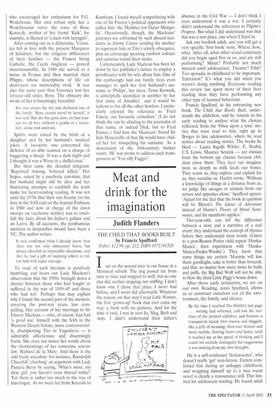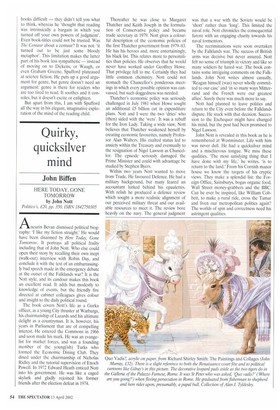Meat and drink for the imagination
Judith Flanders
THE CHILD THAT BOOKS BUILT by Francis Spofford Faber; f12.99, pp. 212, ISBN 0571191320 Isat on the second stair in our house in a Montreal suburb. The dog passed me from time to time and stopped to sniff, but no one else did, neither stopping nor sniffing. I don't know why I chose that place, I never had before, and I never did afterwards. Whatever the reason, on that step I read Little Women, the first 'grown-up' book that ever came my way: a book with no pictures. And for the time it took, I was in turn Jo, Meg, Beth and Amy. I didn't understand their father's absence in the Civil War — I don't think I even understood it was a war. I certainly didn't understand the references to Pilgrim's Progress. But what I did understand was that this was a new place, one where I fitted in.
Ask any bookish adult, and you will get a very specific 'first book' story. Where, how. what. After all, what other social constructs did you begin aged five or so, and are still performing? Music? Probably not much interest until adolescence. Theatre? Film? Too sporadic in childhood to be important. Television? It's what you did when you weren't doing anything. Everyone reading this review has spent more of their lives reading than they have performing any other type of learned behaviour.
Francis Spufford, in his entrancing new book, The Child that Books Built, understands the addiction, and he returns to his early reading to analyse what his choices reflected, from the 'Once upon a time' stories that were read to him, right up to Borges in late adolescence, where he read stories about reading stories. The books he liked — Laura Ingalls Wilder, E. Nesbit, CS. Lewis, Maurice Sendak — are classics from the bottom up: classics because children crave them. They feed our imaginations as deeply as milk feeds our bones. They warm us, they explore and explain for us, they socialise us. Hazlitt wrote, 'Without a knowledge of things at a distance from us, we judge like savages or animals from our senses and appetites alone.' Spufford agrees: 'Adjust for the fact that the book in question will be Blyton's The Island of Adventure instead of Hume's Theory of Moral Sentiments, and his manifesto applies.'
Two-year-olds can tell the difference between a story and a narrative of a real event; they understand the concept of rhymes before they understand most words. (Listen to a post-Beatrix Potter child repeat 'HunkaMunca', then experiment with 'HunkaMunca-Punka-Wunka'.) They know that some things are certain: Mummy will kiss them goodnight, cake is better than broccoli, and that, no matter how many times he huffs and puffs, the Big Bad Wolf will not be able to blow the third Little Piggy's house down.
After those early certainties, we are on our own. Reading, notes Spufford, allows us to construct ourselves out of the environment, the family, and silence:
By the time I reached The Hobbit's last page . writing had softened, and lost the outlines of the printed alphabet, and become a transparent liquid, first viscous and sluggish, like a jelly of meaning, then ever thinner and more mobile, flowing faster and faster, until it reached me at the speed of thinking and I could not entirely distinguish the suggestions it was making from my own thoughts.
He is a self-confessed 'fiction-eater', who doesn't really 'get' non-fiction. Fiction comforted him during an unhappy childhood, and wrapping himself up in a nice warm novel is clearly a reassurance still. This limited his adolescent reading. He found adult books difficult — they didn't tell you what to think, whereas he 'thought that reading was intrinsically a bargain in which you turned off your own powers of judgment'. Even book-titles could not be trusted. Was The Centaur about a centaur? It was not: 'it turned out to be just some bloody metaphor'. This limitation makes the latter part of his book less sympathetic — instead of moving on to Dickens, or Waugh, or even Graham Greene, Spufford plateaued at science fiction. He puts up a good argument for genre, but genre doesn't need an argument: genre is there for readers who are too tired to read. It soothes and it consoles, but it doesn't excite or enlighten.
But apart from this, I am with Spufford all the way in his elegant, imaginative exploration of the mind of the reading child.



















































































 Previous page
Previous page